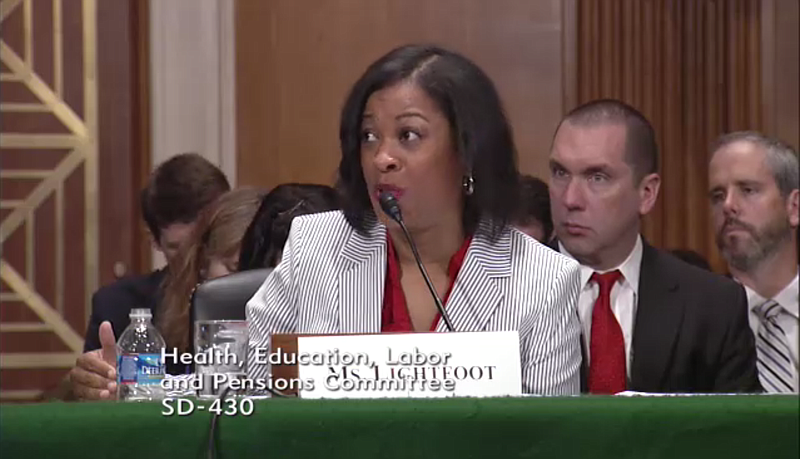Stacy Lightfoot, a former adjunct professor at the University of Tennessee at Chattanooga and the vice president of college and career success at the Public Education Foundation, asked Congress on Wednesday to provide more guidance and support to low-income and first-generation college students on their way to completing their degrees of choice.
Lightfoot herself grew up in a low-income, single-parent home, where statistics suggest that she could have ended up in a low-wage job and without a college degree, she said.
However, Lightfoot credited the efforts of her mother and college counselor in getting her into DePauw University in Indiana.
"She was my translator," she said of counselor Susan Street. "Because of the knowledge of one advocate, the trajectory of my life has changed."
In her Congressional testimony, Lightfoot argued that the best way to guide low-income and first-generation students toward a college degree is to offer more information tailored to prospective low-income students, especially through the support of guidance counselors.
She also suggested that, while students have access to information such as extracurricular activities and classes offered, they do not have sufficient data on long-term student outcomes, job placement rates, loan default rates and financial aid policies.
"These data are central to helping students select the best-fit institution where they are most likely to succeed and graduate," she said.
But U.S. Sen. Lamar Alexander of Tennessee, the ranking Republican on the Health, Education, Labor and Pensions committee, appeared to throw cold water on the idea of additional college disclosure requirements in his opening remarks.
Alexander pulled out a 900-page binder purportedly containing what one university was required to disclose, including what he called a "dizzying variety of ways current disclosures must be sent to students."
"Items range from the useful and necessary, such as terms and conditions of student aid, to such things as informing students when Constitution Day is," Alexander said.
"The question is, are all those necessary, are all those useful to students?" he asked. "The more important question is, how much of this is useful to students making a college choice?"
Though Lightfoot said universities should offer more information to help low-income students better understand financial aid and other things, she also applauded efforts to simplify the Free Application for Federal Student Aid, or FAFSA, long criticized as an over-complicated document that discourages low-income students from applying for aid.
However, she ran into flak when she argued that the federal government needs to support more human "translators," such as the guidance counselor who helped her, for low-income students to help guide them through the often-complicated college application process.
"They are relying on a trusted adult just like I was relying on a trusted adult," Lightfoot said. "Susan Shipley would not have sent me to a college that did not meet my need."
But U.S. Sen. Bill Cassidy, R-La., argued in favor of less labor-intensive databases and perhaps even mobile apps to make information available to students and parents.
"Is this something where someone could log on and put in the variables? Because personnel are very expensive," Cassidy said. "Whereas the app is something that could be 99 cents on iTunes."
Contact staff writer Ellis Smith at esmith@timesfreepress.com or 423-757-6315.
